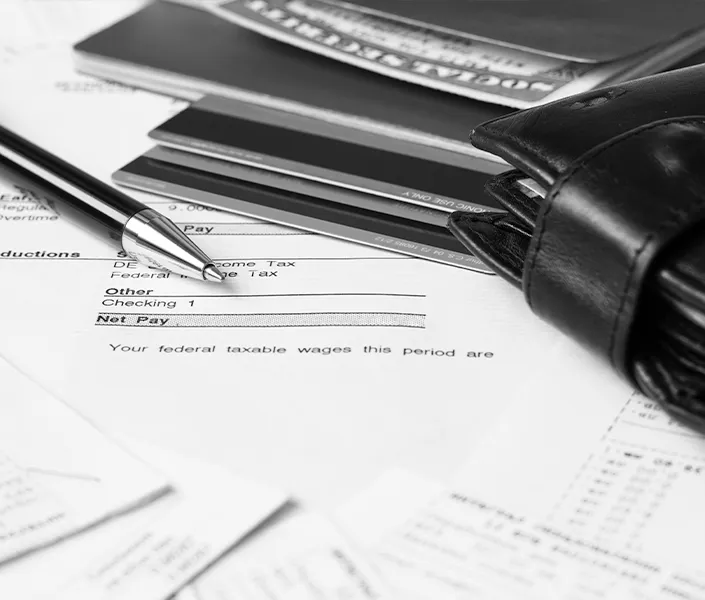It's Your Money, Keep More of It
Fees happen, and they add up. While some fees are unavoidable , there are things you can do to spend less on fees.
For example, open an account with SF Fire Credit Union. Since we don't have shareholders, we return profits to members in various forms, including lower and fewer fees and better rates on loans.
Common Types of Fees
Here are some of the common fees you might find yourself paying in the banking world:
- Minimum Balance Fee
- ATM Surcharges
- Foreign Transaction Fees/Currency Exchange Fees
- Overdraft Fees
- Late Payment Fees
- Credit Report Fees
- Pay-By-Card Fees From Merchants
- Paper Checks
- Inactive Account Fees
- Notary Fee
Now let’s consider each of these fees and ways to avoid them.
Minimum Balance Fee
Many banks charge a monthly maintenance fee unless you keep a minimum balance in your account, which isn’t very helpful for a checking account.
An SF Fire Credit Union Checking Account has no minimum balance, no monthly fee, and free ATM surcharge rebates.
ATM Surcharges
When you need cash, you look for the closest ATM, right? With ATM surcharges averaging anywhere from $2-$4, you might spend a lot each month to access your own money.
A checking account and ATM/Debit Card from SF Fire Credit Union eliminates this fee for you in two ways:
- When you have to use an Out-of-Network ATM, SF Fire Credit Union’s ATM Anywhere Rebate program will reimburse you for up to 12 surcharges per month (up to $4 per surcharge)
- You have access to 30,000+ ATMs nationwide on the Co-Op Network; you’ll never pay a surcharge at one of these machines
Another way to avoid ATM surcharges? Take advantage of cashback options at grocery stores and other merchants when you use your debit card. There are usually no fees for cashback requests.
Foreign Transactions or Currency Exchange Fees
When you're traveling internationally, you could pay 1-3% in foreign transaction or currency exchange fees, depending on your card issuer.
If you travel a lot, it’s worth getting a card with no foreign transaction or currency exchange fees, such as a Platinum Visa® credit card from SF Fire Credit Union.
Overdraft & Returned Item Fees
Overdraft fees can really mount up, whether your transactions are paid or rejected by your institution.
Even if you sign up for a service to have your institution pay your overdraft transactions, be sure to set up as many free sources of overdraft protection as you can, such as:
- One or more savings accounts Since there is a limit on how many times funds can be taken from a given savings account per month, having two or three savings accounts set as overdraft protection sources gives you two or three times the normal number of permitted transfers
- A Platinum Visa® Credit Card. There are no limits on how many times you can advance funds from your SF Fire Credit Union Visa® Credit Card to your checking account, and there are no flat fees for this. However, please note that these advances do begin to accrue interest from the day of the advance.
In addition to Overdraft Protection, be sure to set up free Low Balance Alert notifications, which can be delivered by email, push notification, and text messages.
Late Payment Fees
We all get busy. Don’t let a memory lapse cost you a late payment fee. Quickly set up automatic payments and never stress again.
For loans with SF Fire Credit Union, other than First Mortgages:
- Use automatic transfers through Online & Mobile Banking to set up recurring payments to loans at the Credit Union. There are never any fees for one-time or recurring transfers (First Mortgages have a separate process for setting up automatic payments, but again, no fees for automatic payments).
For payments to other merchants or institutions:
- Use our free Online Bill Pay to schedule one-time or recurring payments. Many common merchants and banks support e-Payments, which mean your payments will post within 1-2 business days. And many merchants also support eBills, which lets you connect your account with that merchant to pull your statement data into your SF Fire Credit Union Bill Pay service (you can even schedule automatic payments that adjust based on the eBill data).
Need to move funds on a certain date to fund those payments? Remind yourself when loan payments are due by setting up Notifications by email, text messages, or Push Notifications, but schedule them for a day or two in advance to give yourself time to make any deposits or transfers.
Credit Report Fees
As you plan your financial future, it’s important to review your credit information. Your credit score impacts both what loans you qualify for and the rates you pay.
A credit report from one of the major credit reporting agencies (Experian, Equifax, or TransUnion) is a good way to monitor the health of your credit and watch for any unusual activity.
However, a lot of the options for getting your credit report require a fee, either one-time or as a subscription service. .
Here are two easy steps for getting the credit information you need without paying a fee:
- Visit annualcreditreport.com. Every year, you can get one free copy of your credit report from each bureau. And while the credit report doesn’t include an actual score, you can get quarterly updates of your credit score when you…
- Add the free FICO® Score Feature to your SF Fire Credit Union Online & Mobile Banking Account.
Pay-by-Card Merchant Fees
A lot of your financial business is done online, including making payments to merchants like PG&E or other utilities. The easiest method might be using a debit or credit card, but a lot of these merchants charge a fee, usually a percentage of the amount you are paying.
You might want to use your credit card for these payments for the awards points, but keep in mind that the percentage you are paying in a merchant fee is likely to exceed the rate at which you are earning points.
Two alternatives for making these payments can help you save on fees:
- Use your checking account’s routing and account number instead of a card number. ACH Transactions generally do not have a merchant fee charged. And you do have a checking account number even if you don’t write checks.
- Use a free Online Bill Pay service. You can control when to send a payment to a merchant and you won’t pay any fees.
Paper Checks
While checks are perhaps less popular than they used to be, they still serve an essential function for financial business.
However, it costs money to order checks. An alternative is using our free Online Bill Pay service to send payments to individuals or merchants.
Additionally, when you really need a physical check, such as for a security deposit on a new apartment, you can request a Cashier’s Check from our Contact Center or branch, with no fees for our members.
Inactive Account Fees
It’s easy to open an account online. But will you use it? Accounts that become inactive may be subject to inactivity fees.
At SF Fire Credit Union, if you have an account with no activity for 12 months, you may be subject to a $3 monthly inactivity fee unless:
- You have a minimum of $500 on deposit; or
- You have an open Term Certificate in the middle of a maturity term
How do you avoid inactivity fees? It’s simple:
- Conduct at least one transaction on your SF Fire Credit Union account (deposit or withdrawal) every 12 months
- Keep your contact information up to date. we send out a letter to the address on file before inactive accounts begin accruing fees.
Notary Fees
Life is full of important decisions: buying a home, setting up wills and trusts, establishing a medical power of attorney, etc.
A lot of documents required for these transactions require notarized signatures. Notary fees are usually not excessively high, often ranging $10-15 per signature, but why pay when you don’t need to do so? Notary services are free to members of SF Fire Credit Union.




